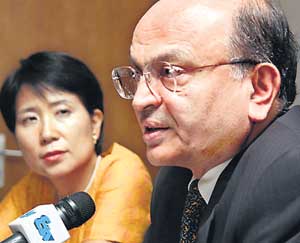
US$900 mln from World BankBank board meets on June 5 to approve CAS
The World Bank is due on June 5 to approve its four-year, $900 million-worth, Country Assistance Strategy (CAS) for Sri Lanka which will deal mainly in projects on connecting communities with markets and improving infrastructure. Praful Patel, Regional Vice President, South Asia of the World Bank, who made this announcement on Friday at a Colombo briefing for a small group of journalists, also praised the government for its efforts to reduce poverty and sustaining economic growth despite the conflict. “This (poverty-reduction) is a very good piece of news which we must congratulate the government and people,” he told reporters during a visit to Sri Lanka ahead of the end of his five-year term in the current position and retirement from the Bank in August. Patel, flanked by the Bank’s Country Director Naoko Ishii, said the Bank Board would be discussing the new 4-year CAS at its June 5 meeting and hopefully get it endorsed. “In the past few months the Bank has in close consultation with the government and civil society been putting together this strategy. This is one that has been fully endorsed by the government,” he said. The CAS is the Bank’s work plan over a four-year period. The current one for Sri Lanka which had an average spending of US$100-150 per year and totalled some $700 million ends in June. The new CAS aims to spend around $225 million a year, totalling $900 million for four years. Patel said according to surveys, poverty has declined rapidly in 2006-2007 to 15 percent from 22 percent in the earlier years and much of this has taken place outside the Western Province. He said the 7 percent drop was ‘huge and creditable,’ adding however that poverty reduction is a trend that has been happening across South Asia as compared to other regions. Asked whether the Sri Lankan figures reflected the actual ground situation, he said the surveys are based on laid down benchmarks but noted that sections of the population like internally displaced people may have been worse off and maybe some other sections too. He said Sri Lanka’s growth has been both difficult and challenging. “There is a need for progress to be made in the political economy side. Issues like the fiscal deficit remains high but the trends (of the deficit coming down) are in the right direction.” Patel commended the government for increasing domestic fuel prices unlike some other countries in the region, saying this was the safest way to handle price hikes. “The government has also increased electricity tariffs,” he said, adding that‘there was a huge bleeding of budgetary resources through subsidies.’ He said that increasing prices by an average 30 percent will make a big impact on reducing losses in the Ceylon Electricity Board. “These price increases are done in a way that will not impact on the poorest of the poor. These increases are difficult but necessary to avoid a huge impact on the fiscal balance,” he said. |
|
||||||
|
||||||
| || Front
Page | News
| Editorial
| Columns
| Sports
| Plus
| Financial
Times | International
| Mirror
| TV
Times | Funday Times || |
| |
Reproduction of articles permitted when used without any alterations to contents and a link to the source page.
|
© Copyright
2008 | Wijeya
Newspapers Ltd.Colombo. Sri Lanka. All Rights Reserved. |
